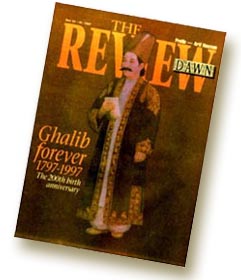
Search the Republic of Rumi |
|
DAWN The Review, December 25-31, 1997
Prof. Karrar Husain is a towering scholar of our times. Equally conversant in religious themes, literature, history, philosophy and political insight, he is seen as a beacon-light of guidance (no exaggeration) in all these areas by students and scholars alike. It is rather unfortunate that so many of his writings remain dispersed. While an anthology would definitely be a valuable asset for many, we shall here mention three of his uncollected writings on Ghalib that need be remembered on this occasion. Prof. Karrar Husain was one of the speakers twenty-eight years ago when Idara Yadgaar-e-Gahlib celebrated the birth centenary of the poet. His speech (in Urdu), included in the report of the ceremony, focused on the link between Ghalib and Pakistani culture. An excerpt from the speech embodies his main thesis: "Ghalib presented a profound positive reaction on an important turning point in the history of the Indo-Muslim civilisation. The way he influenced the changing shades of feelings of this civilisation is perhaps a unique phenomenon in the literary history of the sub-continent. [What we must remember is that] we had a civilisation even before the making of Pakistan, and that civilisation did not end when Pakistan came into being. It is this same Indo-Muslim civilisation that we see, under different geographical and political circumstances, as the Pakistani civilisation. Therefore, even though Ghalib wasn’t born in a Pakistani city, and even though there are many Pakistanis who can’t understand Urdu, and even though the people living in India have full rights to claim Ghalib as their own, there exists nevertheless between ourselves and Ghalib that affinity which is imperative for the passing down of cultural heritage. [The affinity] for the want of which the remains of the past civilisations born on our own land become exhibits in museums and fail to develop into legacies." This speech was delivered in the wake of the deepest cultural turmoil in the history of Pakistan, the crisis that eventually led to the breaking up of the country. Without going into the newspaper details (which is not characteristic of him anyway) Prof. Karrar Husain presented certain suggestions on cultural reconstruction: "If we have a real critical awareness of our civilisational heritage, i.e., if it is constitutes a live and active part of the life of our mind, then we can participate more effectively in this historical process. To acquire a critical awareness of the past is in fact participating in that historical process." These words are just as refreshing today as they were in 1969. On the same occasion, the Idara commissioned Prof. Karrar Husain to put down a brief biographical treatise on Ghalib. Ghalib: Sab Achcha Kahein Jissay was published in Bangla, Punjabi, Balochi, Pushto, Sindhi translations as well as in the original English. It is a valuable appraisal of Ghalib’s life, time, mind and art through subjectively written 43 page. What is most admirable is its analytical mode which persists throughout. Another writing on the subject, equally interesting, is Prof. Karrar Husain’s preface to Dr. Aftab Ahmad’s Ghalib-e-Ashufta Nava (1989). Prof. Karrar Husain’s comments which appear as side remarks while introducing the contents of the book offer brief glimpses into Ghalib’s mind and art from Karrar Husain’s own point of view. The one thing for which these writings stand out from many others about Ghalib is the underlying assumption that the writer as well as the reader are themselves a continuation of Ghalib’s own civilisation at a different point in time and space. This awareness is a legacy of Karrar Husain’s generation, for whom the relations with the previous century and the previous phase of history were very much visible while it was growing up. The ones that are coming after need to take this on too. And it seems, depressing as it may be, that there is little willingness to promote that message today. Ghalib is one magnificent bridge that stands between the civilisation that is Pakistan and the thousand years of glory that were Indo-Muslim civilisation. To sever links with the mind of Ghalib would be to let go everything that our ancestors took a millennium to build – and we seem to have taken merely fifty years to destroy. |
The one thing for which these writings stand out from many others about Ghalib is the underlying assumption that the writer as well as the reader are themselves a continuation of Ghalib’s own civilisation at a different point in time and space. |
||
